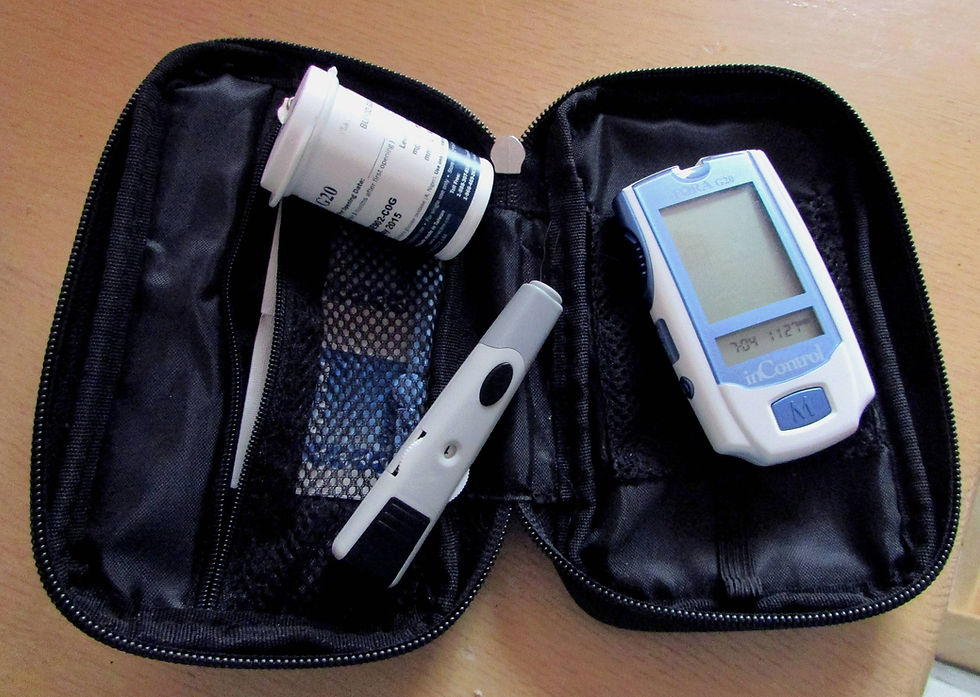Supporting Young Children with Diabetes in Child Care: Why a Health Care Consultant Matters
- Kimberly Kostas

- Aug 27, 2025
- 3 min read
Diabetes is increasingly affecting children, even the very young. The CDC reports that an estimated 352,000 children and adolescents under age 20 in the U.S. have diagnosed diabetes, which includes both type 1 and type 2. Among children under age 5, research shows that the incidence of type 1 diabetes is rising quickly, with some studies finding a 3.5% annual increase in new cases in children aged 0–4 years. This highlights the importance of awareness and preparation in child care environments.

Why This Matters in Child Care Centers
Young children with diabetes rely heavily on adults for care. Unlike older children, toddlers and preschoolers cannot reliably recognize or communicate the warning signs of low or high blood sugar. That makes it essential for child care staff to:
Follow an Individual Health Care Plan (IHCP) or Diabetes Medical Management Plan (DMMP) developed with families and providers.
Be prepared to administer insulin or glucagon when prescribed.
Monitor blood sugar with finger-stick testing or continuous glucose monitoring devices.
Recognize symptoms of hypoglycemia (shakiness, sweating, irritability, confusion, loss of consciousness) and hyperglycemia (increased thirst, frequent urination, fatigue).
Know emergency protocols to act quickly and appropriately.
Proper diabetes management allows children to safely participate in daily activities and reduces the risk of serious complications during the child care day.

How a Health Care Consultant Supports Diabetes Management
As the owner of PediNurse LLC, I have been providing health care consulting services to child care centers since 2020. With my background as a certified pediatric nurse and caring for many children with diabetes, I work closely with centers to develop policies, train staff, and maintain compliance with state regulations.
Here’s how a health care consultant can help your program:
1. Policy Development & Review
Ensuring your center’s diabetes care policies are clear, practical, and compliant with state regulations, as well as best practices recommended by the American Diabetes Association (ADA) and American Academy of Pediatrics (AAP).
2. Staff Training
Providing hands-on instruction so staff feel confident in monitoring blood sugar, giving insulin, and recognizing diabetes emergencies.
3. Regulatory Compliance
Helping programs stay prepared for licensing visits and reducing liability through compliant, well-documented practices.
4. Ongoing Support
Offering continued consultation so centers have a trusted resource when questions arise or updates are needed.
The Importance of a Health Care Consultant
For a child with diabetes, a missed sign or delayed response can quickly escalate into an emergency. Partnering with a qualified health care consultant like PediNurse LLC provides:
Confident, well-trained staff ready to act in emergencies.
Clear, compliant protocols tailored to your center’s needs.
Ongoing guidance to adapt to new challenges or treatment changes.
Peace of mind for families who entrust you with their child’s care.

Take Action Today
Child care providers play a critical role in keeping children with diabetes safe, especially those under age 5. With the support of PediNurse LLC, your program can ensure compliance, strengthen staff preparedness, and create a safe environment for every child.
Contact PediNurse LLC at www.pedinurseconsulting.com for more resources and blog posts tailored to child care professionals.
References
Centers for Disease Control and Prevention (CDC). National Diabetes Statistics Report, 2022.
Mayer-Davis EJ, et al. Incidence Trends of Type 1 and Type 2 Diabetes among Youths, 2002–2012. New England Journal of Medicine, 2017.
Vehik K, et al. Incidence Trends for Type 1 Diabetes in Children Aged 0–4 Years: A Multinational Analysis. Diabetes Epidemiology, 2012.
American Diabetes Association. Diabetes Care in the School and Child Care Setting. Diabetes Care, 2020.
American Academy of Pediatrics. Managing Chronic Conditions in Child Care Settings.




Comments